The Experiment That Could Redefine Search
Google’s Search Generative Experience (SGE) is an ambitious experiment that aims to revolutionize how we interact with search engines. However, like any groundbreaking innovation, it’s far from a finished product.
Just as self-driving cars require years of refinement, testing, and real-world adaptation, SGE needs time to mature, improve its technology, and assess its impact on users.
Yet, there’s a growing assumption that SGE — and generative AI platforms like ChatGPT or Bard — will completely disrupt search as we know it, replacing traditional methods and consolidating how we find information.
But this binary thinking oversimplifies the evolution of technology. Just as Facebook, Instagram, Snapchat, TikTok, Pinterest, LinkedIn, and X each carve out unique roles in the social media ecosystem, multiple platforms and models can coexist in the search landscape.
Every platform serves a specific purpose, and user behavior adapts based on the context. While SGE Google and AI-driven platforms bring exciting possibilities, they’re not one-size-fits-all solutions. Traditional search still holds value, offering depth and precision in ways AI hasn’t mastered yet.

What is SGE?
Before diving into the misconceptions, let’s first clarify what SGE is all about.
SGE represents Google’s effort to enhance traditional search using AI. It aims to provide users with deeper, more intuitive search results for every query. The goal is to transform how people search, simplify complex inquiries, and deliver faster, more actionable insights.
According to Google, SGE enables users to:
- Ask more nuanced and descriptive questions that go beyond traditional keyword searches.
- Quickly grasp the essence of a topic with curated links to explore further details.
- Kickstart tasks like drafting content or generating images directly within the search interface.
- Seamlessly continue their search journey with conversational follow-ups and suggested next steps.
At its core, SGE isn’t just about answering questions — it’s about reimagining how we interact with information, making the process more dynamic, contextual, and efficient.
Why does Google SGE matter?
SGE represents the next evolution of search engines. Rather than displaying a list of blue links, SGE provides AI-generated responses to user queries, often summarizing key information from top-ranking content. This means that search engines like Google are moving toward offering users direct, concise answers without requiring them to click through multiple sites.
This shift changes the game for multifamily marketers. If your property’s website, blog, or content marketing strategy isn’t optimized to appear in SGE responses, you risk losing visibility and, ultimately, potential leads. Traditional SEO principles still apply, but they must be expanded to align with how AI curates and prioritizes content.
What’s the impact on multifamily marketing?
1. Shifting visibility from clicks to summaries
Google SGE reduces reliance on traditional organic clicks by summarizing content directly within the search engine results page (SERP). If your content isn’t surfaced in AI summaries, this could mean fewer direct website visits for multifamily properties.
However, the upside is that well-optimized content has the potential to be featured in these summaries, increasing your visibility to renters at a critical stage in their search journey. Being included in an SGE response could position your property as a trusted, go-to source.
2. Increased importance of informational content
Renters often use search engines to explore neighborhoods, compare amenities, or find advice on leasing. SGE prioritizes content that answers these queries comprehensively and accurately. Thus, producing high-quality, value-driven informational content is more critical than ever.
Blogs, FAQs, and resources tailored to renter pain points — such as “best neighborhoods for families” or “tips for leasing your first apartment” — can position your property as an authoritative source that SGE highlights.
3. AI-powered local search optimization
SGE leverages AI to improve local search accuracy. For multifamily properties, this means that appearing in SGE summaries for queries like “best apartments near downtown Austin” or “pet-friendly apartments in Miami” requires a renewed focus on local SEO tactics. Accurate Google Business Profiles, consistent NAP (Name, Address, Phone Number) data, and localized content are crucial in being featured.
AI Disclaimers and Compliance
As AI-generated content becomes more prevalent, ensuring transparency and compliance has become a priority for businesses leveraging these tools. Integrating SGE into search engines like Google amplifies this need, as users demand clarity and authenticity in the content they interact with.
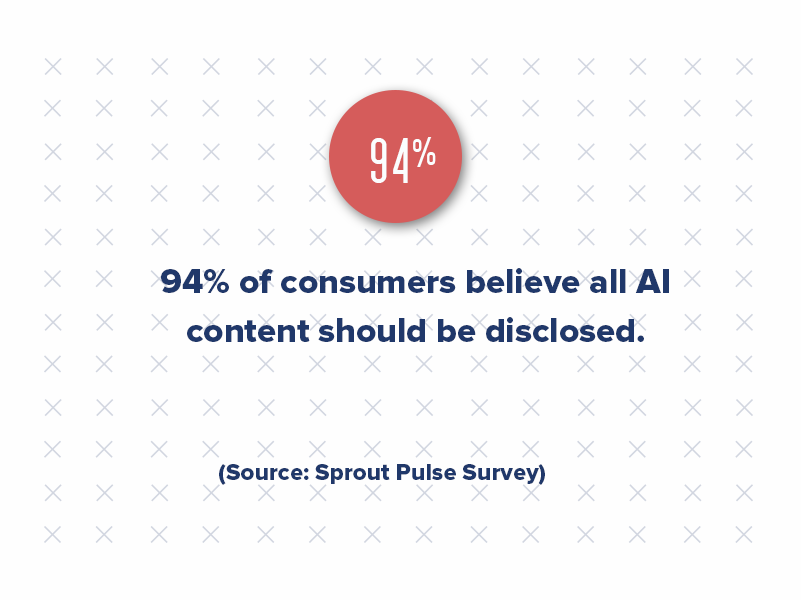
Why do you need AI disclaimers?
A Q2 2024 Sprout Pulse Survey revealed that 94% of consumers believe all AI content should be disclosed, highlighting a growing concern about transparency. Furthermore, 46% of consumers are less likely to buy from a brand that posts AI-generated content without acknowledgment. This sentiment underscores the importance of building trust with your audience by clearly stating when content is created or assisted by AI.
Many publications, including Google itself, have begun adding disclaimers to articles produced entirely or in part by AI. These disclaimers inform readers and reinforce a brand’s commitment to transparency and ethical practices.
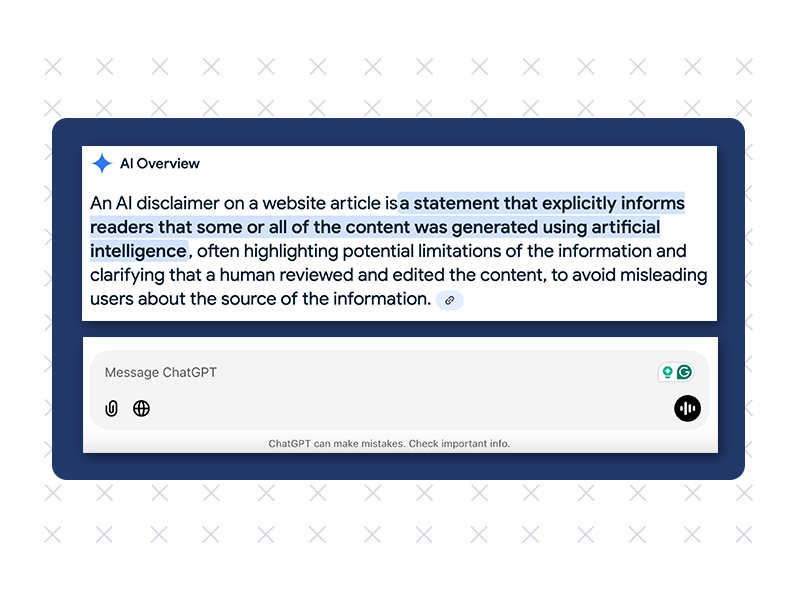
How can multifamily marketers comply?
Incorporating AI disclaimers into your content strategy ensures compliance with emerging best practices while fostering trust among renters:
- Transparency in Content: Include disclaimers on blog posts, emails, or FAQs indicating when AI tools were used in content creation.
- Blend Human Creativity with AI: Balance AI-generated outputs with human insights to maintain an authentic voice that resonates with your audience.
- Train Your Team: Equip your marketing team with guidelines on using AI ethically and disclosing its involvement appropriately.
Adapting Your Strategy for SGE Success
As clickthrough rates decline, ads become less common, and long-tail queries gain prominence, multifamily marketers must adapt to thrive. Here are actionable ways to ensure your strategy aligns with this new era:
1. Optimize for conversational queries
SGE responds to conversational, natural-language questions such as “What are the best luxury apartments in Chicago?” Your content needs to mirror this format. Create blog posts, FAQs, and landing pages that address these questions directly. Use tools like ChatGPT or Google’s “People Also Ask” data to uncover common renter questions and answer them comprehensively in your content.
2. Create long-form, comprehensive content
SGE favors detailed, authoritative content. If your site lacks in-depth resources about your property, community, or the renting process, now is the time to build them. Write detailed blog posts, such as “10 Things to Know Before Renting in Downtown Denver,” incorporating local insights, amenities, and tips to position your property as a trusted expert.
3. Emphasize structured data
Structured data helps search engines understand your content, improving its chances of being included in SGE summaries. Multifamily properties can use schema markup for local business details, reviews, pricing, and amenities. Implement schema for apartments to showcase your property’s unique selling points, such as floorplans, neighborhood details, and available units.
4. Prioritize high-quality local SEO
Local search is crucial for multifamily marketing, and SGE heightens the importance of accurate, localized information. Ensure your Google Business Profile is updated and reflects your property’s offerings. Include location-specific keywords in your meta descriptions, page titles, and content to ensure visibility in location-based queries.
5. Leverage multimedia content
SGE often integrates videos and images into its responses. Multifamily properties that create visually engaging content like property tours, community highlights, and testimonials are more likely to stand out. Create short, engaging videos optimized for YouTube and embed them on your site to increase the likelihood of appearing in search engine results pages.
6. Prioritize E-E-A-T
Experience, Expertise, Authority, and Trust (E-E-A-T) have always been crucial in SEO, but they are even more important in a generative AI world. SGE prioritizes content that exudes credibility and reliability. To excel:
- Showcase experience through user testimonials, case studies, and real-life success stories.
- Highlight expertise with well-researched blog posts and insights.
- Build authority by earning backlinks from reputable sources and optimizing local SEO.
- Reinforce trust through transparent AI disclaimers and high-quality, factual content.
7. Optimize for long-tail keywords
SGE’s focus on detailed, conversational queries makes long-tail keywords more important than ever. By diving deeper into niche topics, you can increase the likelihood of your content being included in SGE responses.
Instead of targeting general terms like “luxury apartments,” optimize for queries such as “luxury apartments near public transit in Denver” or “pet-friendly studio apartments in Miami’s Wynwood neighborhood.”
8. Anticipate lower clickthrough rates
With SGE providing detailed summaries directly on the SERP, users may click through less often. However, this doesn’t diminish the importance of your content — it simply shifts its role. High-quality, scannable content will likely be featured in SGE summaries, ensuring your brand remains visible even if clicks decline.
Pro Tip: To measure your content’s success beyond traditional clickthrough rates, focus on engagement metrics like time on page, bounce rate, and conversion rate.
9. Prepare for fewer ads
As Google integrates SGE, the volume of ads may decrease, making organic visibility even more competitive. To maintain a presence:
- Double down on SEO strategies that align with AI, such as content that answers user queries comprehensively.
- Invest in high-value ad placements that offer tangible ROI rather than spreading your budget across low-performing campaigns.
Adapting to What’s Next
The future isn’t about one technology replacing another — it’s about how these platforms evolve, specialize, and find their place in a constantly shifting digital ecosystem.
Time will tell how SGE reshapes search, how users adapt, and how businesses respond. But what’s clear is this: navigating this new terrain requires a thoughtful strategy, an open mind, and a willingness to adapt to what’s next.

AI’s Growing Role in Promotional Products
Artificial Intelligence (AI) is no longer a futuristic concept. It is changing how the promotional products sector works. But what happens when an industry built on human relationships and creativity meets automation?
AI is making product design and distribution faster than ever. However, it also challenges the balance between efficiency and the “human touch.”
As we look toward the future of multifamily branding, we must ask if AI can truly handle the emotional side of marketing.

A New Era of Customization
People today want products that feel unique. AI makes this possible by looking at huge amounts of data to find out what customers like.
- A Word of Caution: Relying only on math can lead to designs that feel cold. Human creativity is still needed to make sure a gift feels like a genuine “thank you” rather than a data output.
- Data-Driven Insights: AI helps companies choose the right products for specific audiences.
- The Personalization Gap: While AI is fast, it often misses the “why.” A machine can pick a product, but it may miss the emotional connection that makes a branded item special.
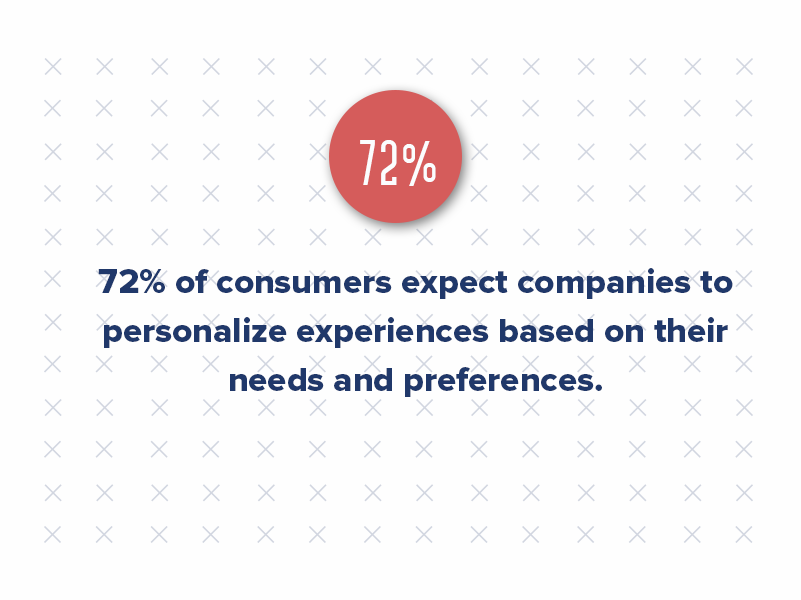
Streamlining the Supply Chain
AI is a powerful tool for managing inventory. It helps businesses avoid overstocking or stockouts.
- Demand Forecasting: AI tools analyze past sales and market trends to predict what will be popular next.
- Reducing Errors: According to McKinsey, AI can cut forecasting errors by 50%. This leads to lower costs and less waste.
- Automation: AI can automatically reorder popular items so you never run out during a big marketing campaign.
Enhancing Design, Not Replacing Designers
There is a common fear that AI will replace artists. However, AI is a helper, not a replacement.
- The Human Edge: AI can suggest colors and layouts based on data. But humans are still the ones who know how to tell a brand’s story through real estate marketing.
- Efficiency Gains: Tools like Adobe Sensei handle boring, repetitive tasks. This lets designers focus on big ideas.
- Productivity Boost: Companies using AI marketing see an average 15% jump in productivity.
Improving Customer Service and Sustainability
AI tools are making the “business” side of promo products much smoother.
- Eco-Friendly Choices: AI can find sustainable materials and suggest ways to reduce waste. It helps businesses join the “circular economy” by designing products that are easier to recycle.
- 24/7 Support: AI chatbots give instant answers to questions about orders or product details. This reduces service costs by up to 30%.
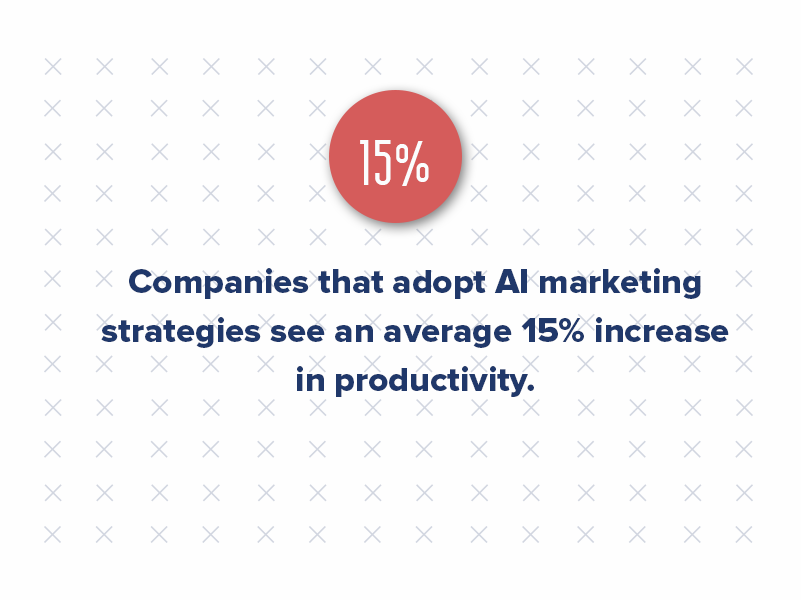
The Challenges of an AI-Driven Future
While the perks are great, there are hurdles to clear:
- Unpredictability: AI struggles to predict sudden shifts in human behavior or unique market changes.
- High Costs: Setting up AI systems can be expensive for small businesses.
- Data Privacy: AI needs lots of data to work. Businesses must comply with laws such as GDPR to protect personal information.
Looking Ahead: What’s Next for Promo?
We are just at the beginning of this shift. Soon, we may see:
- Virtual Previews: Using AR and VR to see how a logo looks on a product before it is even printed.
- Advanced Personalization: Items that are custom-made for one specific person based on their history.
The Bottom Line: The benefits of AI are clear. It offers new ways to stay competitive. However, the most successful marketing strategies will always combine the speed of AI with the heart of human creativity.

The Effectiveness of Predictive Advertising in Multifamily
Predictive advertising has been touted as “the next big thing” in digital marketing — promising marketers smarter targeting, better-qualified leads, and cost-effective ad spend.
Other companies have championed the technology, claiming that predictive analytics can help forecast future renter behavior based on past data, making ad targeting more precise and impactful. But is predictive advertising really the game-changer it claims to be? Does it deliver “said results?”
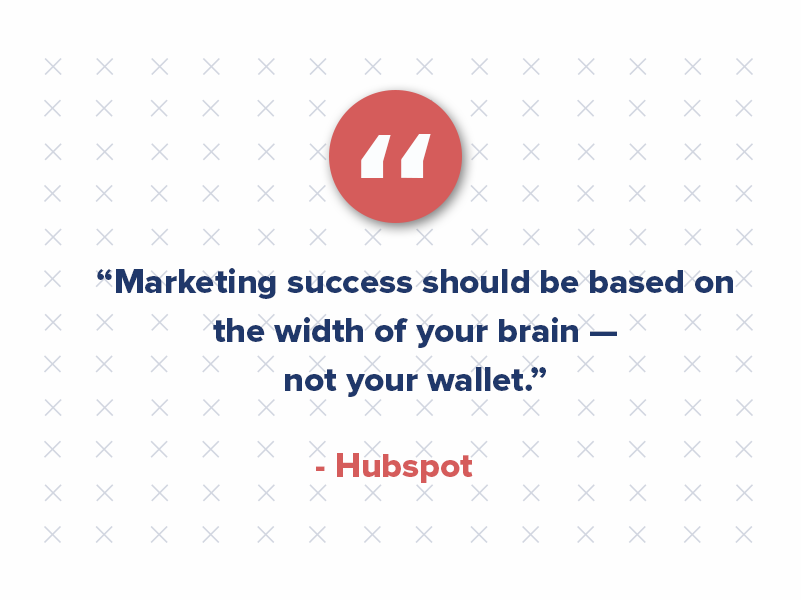
After digging into recent research and analyzing industry results from the last year, the evidence suggests that the effectiveness of predictive ads, especially in multifamily marketing, may not be as clear-cut as proponents would like us to believe.
In fact, we’ve found that more transparent strategies can often deliver better results, which is why we’ve steered away from predictive ad services.
Let’s explore why predictive ads fall short and why Criterion.B takes a more straightforward approach to multifamily marketing.

What Is Predictive Advertising?
If you have spent time working on digital ads, you know the cost has risen significantly in recent years. Meta’s cost per thousand (CPM) has increased 61% yearly, and Google’s programmatic display CPMs increased 75% in the same period, according to The Drum. Meanwhile, many brands are tightening their budgets due to economic uncertainty, yet consumers are expecting better ad targeting, personalization, and overall messaging than ever before.
So how have advertisers and agencies attempted to combat this? Well, they’ve been dabbling in predictive ads (or trying).
“We rushed into [predictive advertising], hoping for big returns but ended up spending too much with little to show for it,” said James Heartquist, owner at Modern Property Solutions. “Our main problem was not using our budget wisely, which led to few sales.”
Predictive analytics uses artificial intelligence (AI) and data from past campaigns to forecast future behaviors. In theory, it allows marketers to target potential renters before they know they’re in the market for an apartment. The idea is simple: by using data like browsing habits, previous searches, demographics, subscriptions, and demographic information, you can predict who is most likely to convert and target your ads accordingly.
Predictive advertising is a subset of predictive analytics that uses historical data, machine learning techniques, and algorithms to target audiences and optimize ad copy and media spending accurately.
In essence, predictive advertising enables brands to build highly targeted audience segments based on millions of behavioral signals and customer attributes. There are several key techniques used in predictive advertising, each offering different levels of sophistication and impact:
- Look-alike modeling: This technique identifies new users who resemble an existing customer group. It’s a simple approach often built into platforms like Facebook and LinkedIn.
- Classification modeling: Similar to look-alike modeling but with an additional layer of filtering, this method excludes users who aren’t ideal targets.
- Click-based optimization: By analyzing user intent, AI predicts the likelihood that a customer will take specific actions, such as clicking on an ad or making a purchase.
- Uplift modeling: This advanced technique predicts how an ad or intervention will affect a customer’s likelihood of purchasing, giving brands even deeper insight into campaign effectiveness.
The Predictive Ads Promise vs. Reality
Companies promote predictive advertising as a way to get more qualified multifamily leads at a lower cost. According to them, this technology helps to refine Google Ads targeting and reach potential renters earlier in their decision-making process.
While this sounds great in theory, industry research shows the results aren’t always as successful as predicted. The goal is to create a more personalized and timely ad experience, but predictive ads can struggle with accuracy as they rely on assumptions about behavior that can be hard to validate. As multifamily experts highlight, the unpredictable nature of renter decision-making makes it difficult for these systems to consistently deliver better conversion rates.
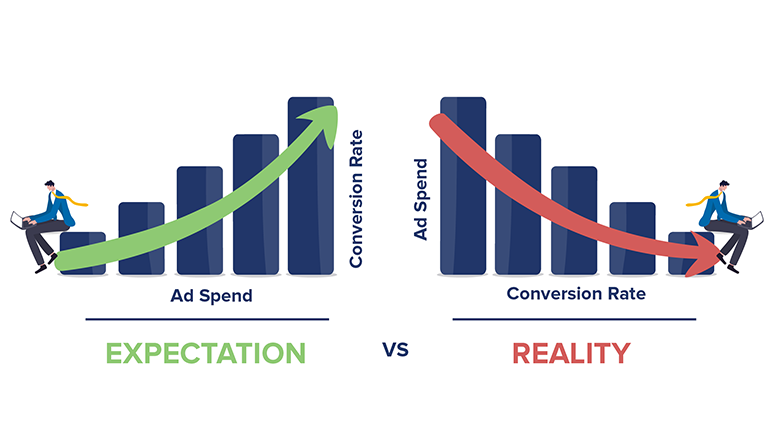
Recent Conversion Logix data showed that while predictive ads could improve click-through rates, the conversion rates (lead-to-lease) weren’t significantly better compared to more straightforward advertising methods.
Predictive Ads Struggle With Accuracy
One of the significant flaws with predictive ads is their reliance on historical data to forecast future behavior. Companies without access to substantial, high-quality data sets may find it challenging to create accurate predictive models.
“A primary challenge for multifamily and real estate marketers in predictive advertising is navigating its complex processes,” said Zach Shepard, principal at Braddock Investment Group Inc. “It involves collecting large amounts of data from multiple sources, analyzing it accurately, and using it to make predictions about potential customers or tenants. This can be a daunting task for those who are not familiar with data analysis and predictive modeling.”
Shepard believes many marketers may lack the necessary tools or resources to implement a successful campaign, which could result in inaccurate predictions or an ineffective strategy that does not yield the desired results.
“In some cases, the negative experience with predictive advertising may stem from unrealistic expectations,” said Shepard. “Marketers may expect immediate and drastic improvements in their marketing efforts without considering the time and effort required to collect and analyze data for accurate predictions.”
Even when sufficient data is available, predictive algorithms often overlook critical variables such as weather changes, shifting moods, or personal relationships — factors that can dramatically influence purchasing decisions in ways that a computer cannot easily anticipate.
“One of the primary issues that marketers face with predictive advertising is inaccurate targeting,” said Robert Fausette, owner of Revival Homebuyer. “Predictive algorithms use data analysis to predict which individuals are most likely to take a certain action, such as clicking on an ad or making a purchase. However, this data is not always accurate and can lead to targeting the wrong audience. This results in wasted advertising budget and lower conversion rates.”
Multifamily Executive reported that renter behavior can be highly volatile, especially in uncertain economic times, making predictive analytics less effective. Renters’ priorities shift based on changing market conditions, economic factors, and personal circumstances that predictive algorithms struggle to account for.
Additionally, predictive models are not static and must be updated continuously to remain relevant. As customer behavior evolves, a model that once worked may quickly become obsolete, leading to inaccurate predictions and wasted ad spend. A perfect example is the 2008 financial crisis, where models predicted mortgage customers would repay loans but failed to account for the collapse in U.S. housing prices.
“Our biggest challenge was getting good leads that actually turn into customers,” said Dino DiNenna, real estate broker at Hilton Head Realty Sales. “We tried a big ad campaign for our fancy apartments, and while lots of people clicked, not many ended up applying. It was frustrating to see all those clicks but so few real leads.”
In multifamily marketing, relying too heavily on outdated models can result in poor targeting, ineffective ad spend, and ultimately, lower ROI. While predictive advertising offers potential, its limitations make it less reliable compared to real-time data-driven approaches that adapt to renters’ immediate needs and behaviors.
In contrast, real-time data like live pricing updates and real-time availability are far more accurate because they reflect the current state of the market. BestEverCRE found that renters are more likely to convert when presented with up-to-date, transparent information such as pricing, unit availability, and immediate offers. This real-time approach provides actionable data, allowing for a more direct path to conversion without relying on speculative forecasts.

The Case for Simplicity: Live Pricing and Availability
One of the most compelling arguments against predictive ads is the simplicity and effectiveness of using real-time data. MultifamilyBiz highlighted that real-time availability and pricing updates directly impact conversion rates because they offer renters the information they need when needed.
By focusing on strategies that prioritize transparency — like showing what units are available right now or offering dynamic pricing — you create a more immediate sense of urgency and trust. Renters are far more likely to act when they know exactly what’s available, at what price, and when they can move in.
Ashley Gawley LRE, founder at Launch Real Estate, advises balancing data with understanding the hyperlocal market, property, and target audience. “For multifamily, look at lease-up rates, turnover, and demand for specific unit types — not just broad demographics,” Gawley said. “Consider hosting focus groups to gain qualitative insights into what’s really driving people’s housing decisions.”
Michael Yerardi, owner of Turning Point Home Buyers also faced challenges with predictive ads when the qds were not matching up with how residents felt about living at the properties. “We listened to what our residents had to say and made big changes,” Yerardi said. “For example, we promised to fix things within 24 hours, which made people much happier. By focusing on making life better for our residents — not just on flashy ads — we got 20% more people to stay with us.”
At Criterion.B, we’ve seen firsthand that simpler methods can outperform more complex, algorithm-based systems like predictive ads. Instead of trying to guess what renters might want in the future, we focus on delivering relevant, real-time information that speaks directly to their current needs.
The Fallacy of Predictability
Predictive advertising often promises that with enough data, marketers can forecast consumer behavior with precision. However, this is where the fallacy of predictability comes into play.
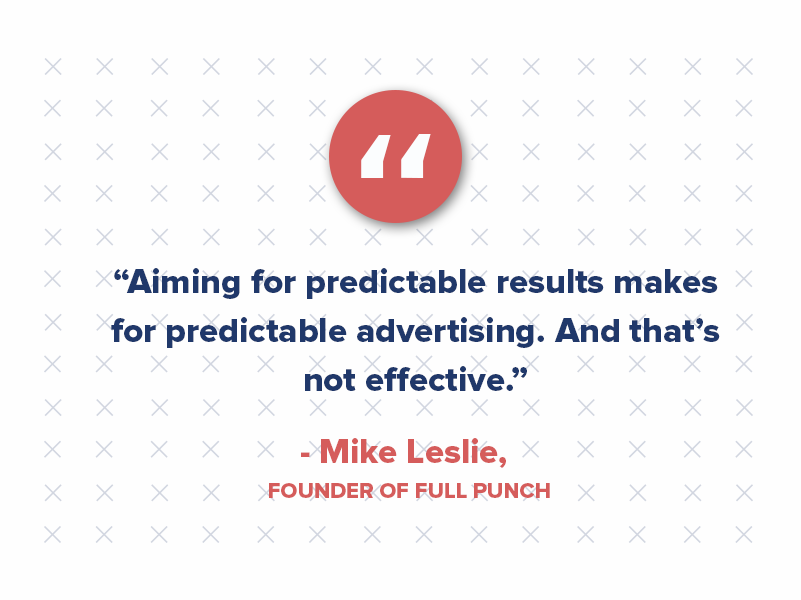
The desire for predictability can lead brands to rely on data and past performance to the point of stifling creativity and innovation. While predictive tools analyze everything from location to preferences, purchases, and search history, they ultimately fail to account for the messiness of human behavior. They can’t account for the emotional and personal factors influencing renter behavior.
Advertising has never been an exact science, nor should it aim to be. The idea that past consumer actions can reliably predict future behavior is flawed, and companies relying too heavily on predictive analytics will likely experience diminishing returns. Past performance does not predict future results. The repetition of predictable tactics inevitably leads to stagnation.
While data can provide insights, the art of advertising lies in its ability to engage, surprise, and break through the ordinary. It’s not about being predictable but about showing up in unexpected places and finding the human connection that resonates with people on a deeper level. Effective advertising is about understanding human behavior — not just the data sets it generates — and creating campaigns that reflect society’s complex, ever-changing nature.
Brands that rely solely on predictive ads risk becoming part of the ignorable 85% of ads that go unnoticed. By rejecting the predictable and embracing creativity, companies can produce advertising that stands out, breaks norms, and becomes part of the cultural conversation.
“We invested in a campaign aimed at prospective renters based on data analytics, but the audience we reached often didn’t align with our ideal tenant profile,” said Justin Landis, founder of The Justin Landis Group. “Many of the leads we received were unqualified, leading to a low conversion rate and wasted marketing dollars. We also faced challenges with the technology itself. The predictive models sometimes failed to account for local market nuances, resulting in ads that felt generic and disconnected from our community’s needs. This misalignment made the campaign feel less personal, and potential renters often overlooked our offerings.”
“The negative experience was frustrating, as we had high hopes for improving our lead generation,” Landis continued. “To pivot, we shifted our focus from purely data-driven advertising to a more integrated approach that included community engagement and personalized messaging. We began leveraging social media to connect with potential renters directly and gather feedback.” This approach enhanced the brand image of The Justin Landis Group. It allowed the company to tailor its offerings to meet audience needs better, ultimately leading to more successful marketing outcomes.
In the multifamily space, where renters’ needs and expectations evolve quickly, it’s essential to stay agile. Predictive ads, which focus on historical data, can leave marketers blind to new opportunities or shifts in renter behavior. Instead of relying on predictive analytics, focusing on live data, real-time updates, and human-driven insights will help brands remain relevant and adaptable in a constantly changing market.
“We learned the hard way that keeping up with what residents want is crucial,” said Nick Stoddard, CEO at KC Property Connection. “We once ran ads aimed at young professionals, but it flopped because we didn’t consider families looking for bigger homes. After tweaking our approach to include families, we saw a big jump in leads and a 15% increase in occupancy rates. This experience taught us that regularly updating our marketing strategies is key to staying on top of changing resident needs.”
The Human Element: Why Predictive Ads Miss the Mark
While artificial intelligence (AI) is growing in digital marketing, its use in long-form content and predictive advertising isn’t without challenges. AI tools used in predictive analytics often reduce complex behaviors to data points, missing the nuances of human decision-making.
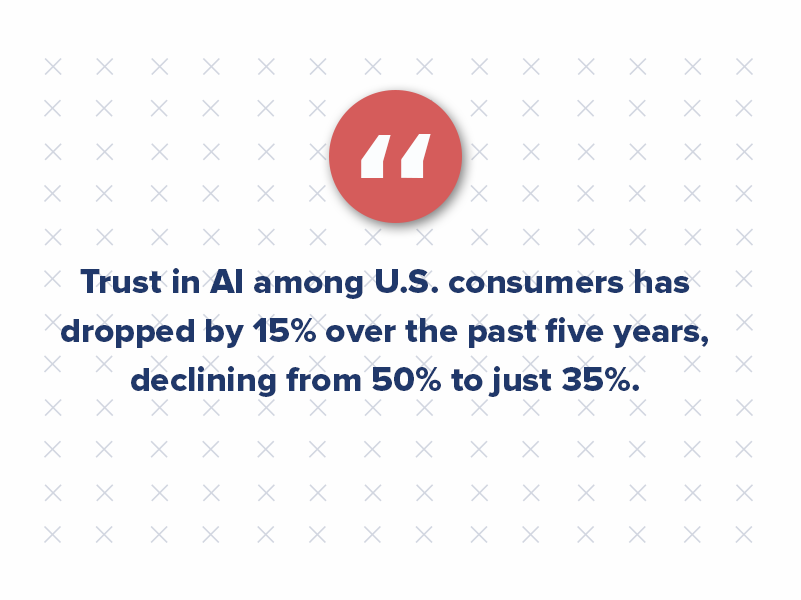
AI-driven predictive ads are not always effective in capturing the attention of renters seeking personalized experiences. Renters prefer authentic and relevant brands, which AI-driven, predictive models often struggle to achieve. Psychology Today reported that 70% of consumers spend more with authentic brands.
“The overreliance on AI in predictive advertising presents a challenge for us,” said Ryan Whitcher, founder and CEO of Harmony Home Buyers. “We initially embraced AI for our ad campaigns but soon realized it led to biased targeting and a 30% drop in qualified leads over three months. To address this, we implemented a hybrid approach, combining AI with human oversight, resulting in a 25% increase in qualified leads within two months and teaching us the importance of balancing technology with human expertise in our marketing strategies.”
Although 77% of advertisers have a favorable opinion of AI, consumer sentiment tells a different story. A 2024 report from the Edelman Trust Institute revealed that trust in AI among U.S. consumers has dropped by 15% over the past five years, declining from 50% to just 35%.
Also, a recent Neil Patel study found that content marketing incorporating personalization and emotional engagement outperforms data-driven, predictive ad strategies by 94.12%. Renters want to feel connected to the brand they’re considering, and predictive ads often fail to create that connection.
At Criterion.B, we prioritize building trust and emotional engagement through tailored content, real-time updates, and personal interactions. This approach builds lasting relationships, which is something predictive ads can’t do.
Why We Don’t Offer Predictive Ads
At Criterion.B, we’ve done our research. While predictive advertising may have its place in certain industries, the multifamily market demands a more dynamic, real-time approach. The unpredictable nature of renter behavior — combined with the increasing need for transparency and trust — means that predictive ads often fall short.
Rather than relying on speculative technology, we focus on proven methods: real-time pricing, availability updates, tailored content, and building genuine connections with renters. This approach doesn’t just drive traffic — it builds relationships. So while the allure of predictive ads is tempting, we’re committed to more personable (and reliable) strategies.

Multifamily Marketing vs. Advertising: Stop Confusing Them & Start Winning!
The digital marketing landscape constantly evolves with new tools and emerging trends. One of the hottest topics is generative AI, a powerful tool that transforms content creation and customer engagement.
But even with all these exciting advancements, a fundamental question remains: What’s the difference between marketing and advertising?
Understanding this distinction is critical to reaching your target audience. While both aim to influence people’s thoughts about your products or services, they take different approaches.
Let’s break it down and explore how generative AI plays a role in this ever-changing field.
Advertising: The Bullhorn With a Target
Think of advertising as a paid announcement. It’s a way to create buzz and let potential customers know about your offerings. Ads on social media platforms, billboards, or TV commercials are all examples. They grab attention and often tell people what to do next, like visit a website or make a purchase.
Imagine a real estate company in Dallas-Fort Worth, where construction is booming. They might use eye-catching billboards to advertise their services. These billboards act as ads, drawing attention and connecting with potential clients.
Marketing: The Mastermind Behind the Scenes
Marketing is the bigger picture. It’s a strategic plan that includes everything from figuring out your unique selling proposition (USP) to creating content and managing customer relationships. It sets the stage for impactful advertising.
Here’s how marketing helps create powerful advertising:
- Finding Your “Why”: Marketing enables you to understand what makes your company special. This unique value proposition is the foundation of all your marketing efforts, including advertising.
- Knowing Your Audience: “Buyer personas” are detailed profiles of your ideal customers. They consider age, interests, and problems your product can solve. By understanding your target audience, you can craft advertising messages that resonate with them.
- Building Relationships: Today’s consumers want a conversation. Marketing helps you create a two-way dialogue with your audience on social media platforms or through email marketing. This builds trust and loyalty, something paid advertising alone might need help.
Content Is King (and Queen)
People are more likely to pay attention to exciting content than flashy ads. Statistics show that content marketing, such as blog posts or social media content, can yield a better return on investment (ROI) than traditional advertising.
We all get bombarded with ads. The key is to make them relevant, not annoying. Here’s where targeted advertising comes in.
Digital Advertising Gets Personal
Digital advertising is no longer a one-size-fits-all approach. Enter Personalized Ads: A New Era.
With targeted ads, messages are carefully crafted to resonate with specific buyer personas, taking into account demographics, interests, and online behavior. This shift from generic advertising to hyper-personalized messaging makes ads less intrusive and more relevant, potentially transforming them from an annoyance into a useful tool.
However, successful marketing goes beyond advertising. A strong social media presence, engaging content, and excellent customer service are crucial for building brand loyalty and fostering positive customer experiences.
The digital marketing landscape continues to evolve, and businesses that can adapt their strategies to leverage the power of personalization, prioritize audience engagement across channels like social media, and deliver exceptional customer service will be the ones that thrive.
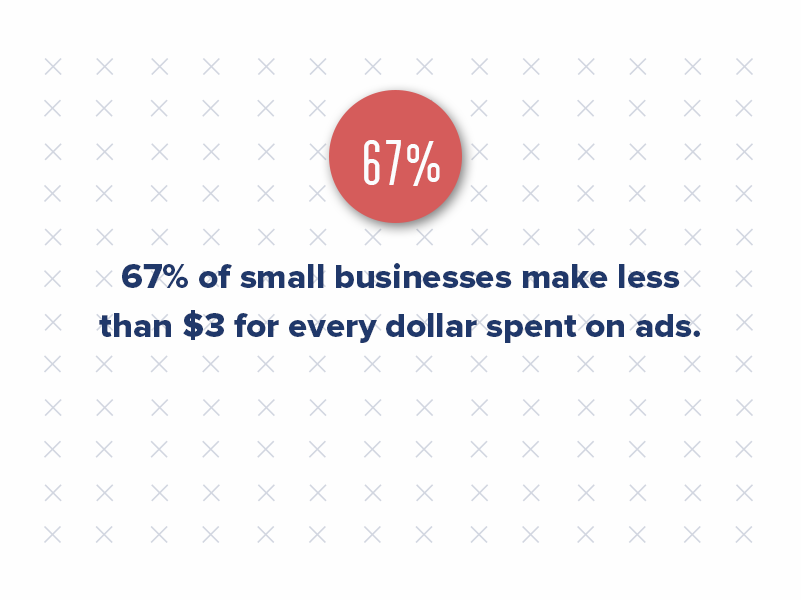
Paid Media Still Works
While content marketing is powerful, paid advertising remains valuable. It’s cost-effective and has a proven track record of success.
However, the key is to be smart about your approach. 67% of small businesses make less than $3 for every dollar spent on ads. If your ad spending often yields diminishing returns, then it’s time to rethink your marketing approach.
Here’s where a comprehensive marketing strategy comes in. By understanding your target audience and creating engaging content for them, you can lay the groundwork for successful paid advertising campaigns.
Additionally, staying on top of the latest digital marketing trends, including content creation and influencer marketing, is crucial to maximize your ad spend.
New technologies like generative AI can help you optimize your paid media efforts. AI can automate repetitive tasks like ad creation and targeting, allowing you to focus on strategic decision-making. Additionally, AI can analyze vast amounts of data to identify the most effective ad placements and messaging for your target audience.
With a well-rounded multifamily marketing strategy and leveraging cutting-edge AI tools, you can significantly improve your return on ad spend and reach your target audience more effectively.
The AI Revolution
Artificial intelligence (AI) is shaking things up in marketing and advertising. Here are some ways AI is changing the game:
- Content Creation Powerhouse: AI can create high-quality content like product descriptions and social media posts, freeing marketers to focus on more significant ideas.
- Super-Personalized Marketing: AI can analyze vast amounts of data to understand customer preferences. This allows for hyper-personalized marketing campaigns, delivering the right message to the right person at the right time.
- Marketing on Autopilot: AI can automate repetitive tasks like managing campaigns and optimizing ads, freeing marketers to focus on creative strategies that drive higher conversion rates.
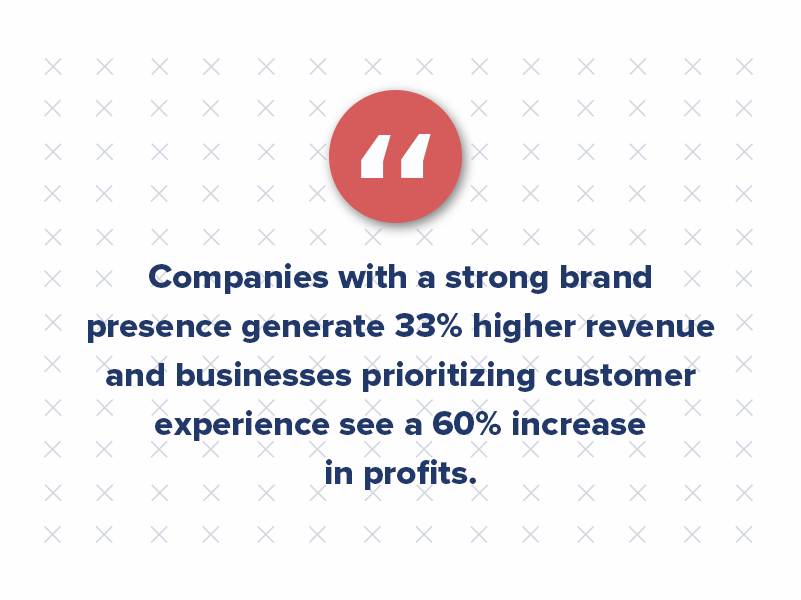
The Future Is Engaged and Data-Driven
When used strategically, marketing and advertising can be a game-changer for your business. Companies with a strong brand presence generate 33% higher revenue. Likewise, businesses prioritizing customer experience see a 60% increase in profits.
A well-executed multifamily marketing strategy that leverages AI and prioritizes audience engagement is no longer a luxury — it’s a necessity for survival and growth.
The Dynamic Duo: Creating Content Magic With ChatGPT and Our Content Marketing Agency
Digital content marketing can be challenging, especially when you have many other operations tasks. Enter Open AI ChatGPT.
The ChatGPT app has revolutionized digital content marketing and how we handle content writing, editing, and multifamily graphic design.

The biggest concerns surrounding this new artificial intelligence feature are: “How does ChatGPT work?” “What are good ChatGPT prompts?” and “Do I still need to hire a content marketing agency?”
Let’s answer each of these questions…
The Future of Generative AI in Property Management Marketing
Much like the shift to digital content marketing in recent years, the rise of generative AI has been slow but steady. And just in the last year, it has BOOMED.
Many industries are still coming aboard the realm of inbound marketing but not quite utilizing generative AI. However, Open AI ChatGPT will be key to becoming more efficient with your content marketing to stand out.
Effective content will help you embrace the feedback loop that allows your content to grow and develop. Only then will your content reach your targeting goals and give you the results you’re aiming for.
Understanding the Value of Generative AI
Before we can dive into how to use open source AI and answer “How does ChatGPT work?” we first need to discuss the benefits of using Open AI.
Generative AI provides marketers a powerful tool to streamline content creation processes and drive engagement. Ultimately, it allows marketers to quickly create large volumes of high-quality content, saving time and effort.
This technology offers fresh perspectives and innovative ideas, sparking creativity and enabling marketers to explore new angles in their content strategies. Moreover, this AI writing tool can optimize content for search engines, enhancing organic visibility and driving website traffic.
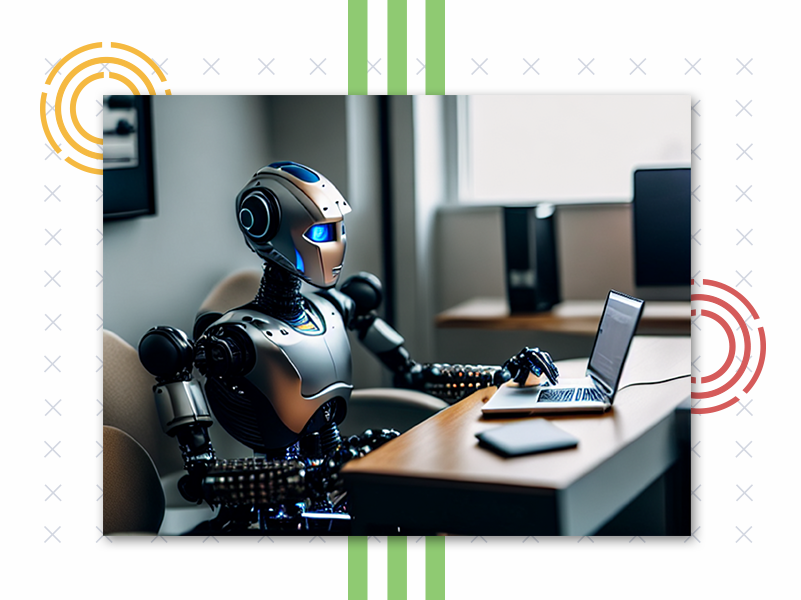
How Does ChatGPT Work?
ChatGPT operates on a sophisticated deep-learning model known as a transformer. This model is trained on vast text data to develop a deep understanding of language patterns and structures.
When a user provides ChatGPT prompts, the model analyzes the context and generates a response based on learned knowledge. It breaks down the ChatGPT prompts into segments, attends to the relevant parts, and generates a coherent output.
The training process involves exposing the model to a massive dataset that includes diverse sources such as books, articles, websites, and more. This exposure enables the writing tool to learn grammar, facts, reasoning abilities, and even some degree of creativity. The ChatGPT app gradually improves its ability to generate human-like responses through this iterative training process.
It’s important to note that while open source AI can produce impressive outputs, it should be used with caution and human oversight to ensure accuracy and maintain ethical standards.
And full disclosure: The AI writing tool wrote the above section about “How does ChatGPT work?”. Why? Because who knows ChatGPT better than the generative AI platform itself? This is exactly what we mean by supplementing your AI content with human oversight: no one knows your business like you do (or your content marketing agency).
How to Use ChatGPT
When utilizing open source AI for your digital content marketing, it’s important to understand how to leverage its capabilities effectively.
1. Use Open AI as a jumping-off tool to generate ideas.
Open source AI is best used to help kickstart your writing process, not execute the entire writing process. Provide clear and specific prompts to guide the AI in generating relevant content. ChatGPT’s output should be a starting point rather than a final piece.
2. Review all generative AI content for accuracy.
Maintain a critical eye and thoroughly review the generated content for accuracy, tone, and consistency with your brand voice. Make necessary edits and additions to ensure the content aligns with your objectives and resonates with your target audience.
3. Utilize open source AI for keyword research and optimization.
Extract valuable insights from the AI-generated content to identify relevant keywords and phrases that can enhance your search engine rankings.
4. Bring human writers and editors into the process.
Embrace the collaborative nature of the ChatGPT app by involving human writers and editors who can infuse creativity, authenticity, and expert knowledge into the content. By combining the power of AI writing with human expertise, you can create compelling and high-quality content that drives results in your digital content marketing efforts.
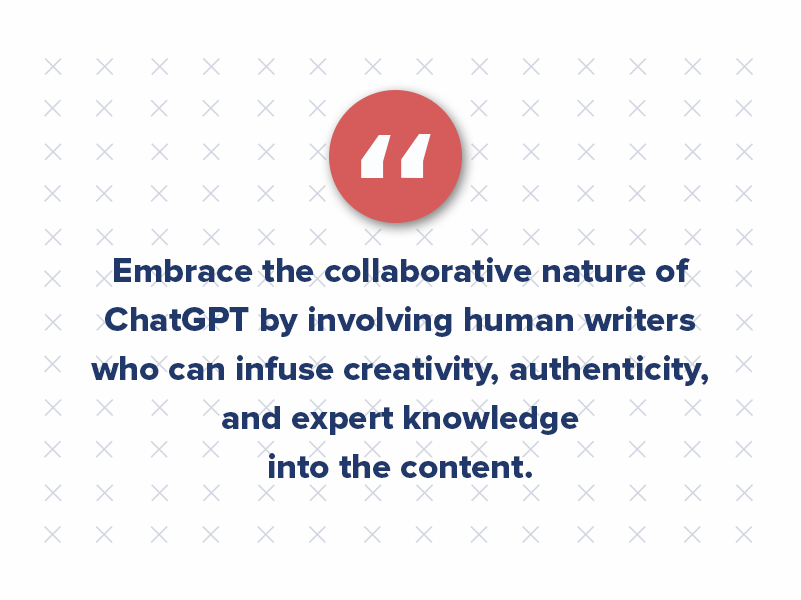
Use Humanized Content to Develop High-Performing Results
Have you ever received an email with your name in the subject line or a newsletter closely tied to a topic you’d been researching? That’s a form of content intelligence. The epitome of content intelligence is the ability to take names or other information gathered about prospects and use that information to enhance content.
Imagine being a decision-maker at a multifamily property interested in a third-party vendor company’s services. Wouldn’t that level of personalization, paired with an email that answers your questions, sway your decision to hire that company at your property?
Studies show that personalized messages can increase email open rates (17.6% open rate vs. 11.4% without personalization). This allows for more information to be gathered and improves your results. It’s a cyclical and powerful process.
The most important thing is to ensure you’re utilizing all the right tools to inform your content. While you can provide ChatGPT prompts to include personalization in the AI-generated content output, the bottom line is that Open AI ChatGPT does not know your brand as you do. And, as mentioned above, it also doesn’t know your customers like you do. Take advantage of this knowledge and personalize your content for the best results.
What Are Good ChatGPT Prompts?
ChatGPT prompts are specific and provide sufficient context for the desired output. They should be framed as questions, statements, or instructions that guide the AI’s response in a targeted manner.
You want to treat this AI writing platform like an intern, providing clear instructions and not being afraid to give it additional instructions if you do not like the provided output.
For example, ChatGPT prompts that begin with phrases like “Can you provide insights on…”, “What are the benefits of…”, or “Please explain the process of…” tend to generate informative responses. Including key details, keywords, or specific parameters within the prompt can help guide the AI’s output toward the desired topic or perspective.
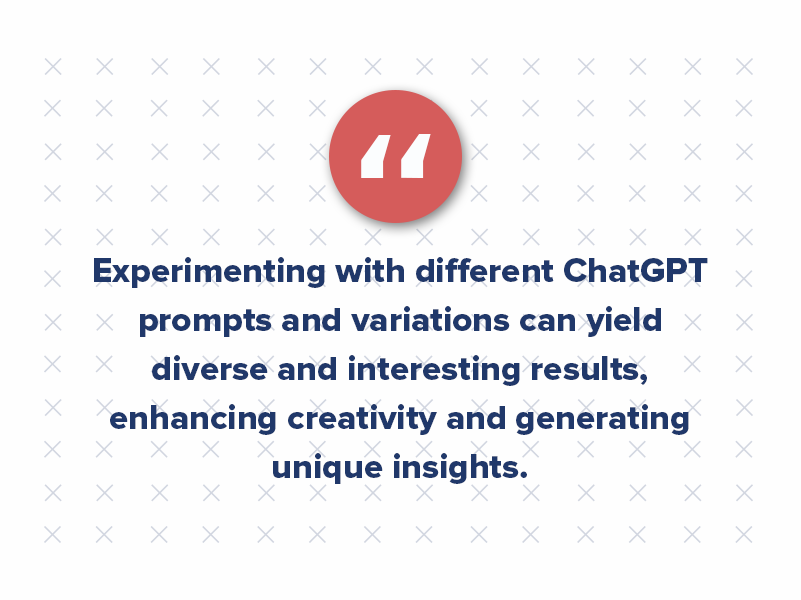
Experimenting with different prompts and variations can yield diverse and interesting results, enhancing creativity and generating unique insights. It’s important to refine prompts, iterate on them, and critically review the generated content to ensure it aligns with your objectives and requirements.
Making the most of this technology is all about what you put into it. The better the input (prompts), the better the output (content).
Here are 5 ChatGPT prompts you should try out this week:
- Website Copy: “Write me 5 new headline options for my website homepage that each focus on the different benefits of [company name] and [services]. Make the headlines punchy, engaging, and 8 words or less.”
- Email Marketing: “Write a personal follow-up email template for when a prospect visits our website at [website link] but never makes contact again. Include a relevant CTA to get them to book a [meeting/demo/tour/etc.].”
- Customer Support: “Write 3 follow-up responses for customers who leave bad reviews. Make each response different and focus on complaints about our [products/services], customer service, and [pain point], respectively.”
- Branding: “Write 2 options for a mission statement and 5 options for a company tagline that accurately reflects this company: [website link].”
- Content Generation: “Write a 1,000-word blog post about the benefits of using a [company name]. Focus the blog to highlight our [services] without sounding overly promotional. Include relevant keywords for SEO.”
Do I Still Need to Hire a Content Marketing Agency?
Hiring a content marketing agency remains essential. While open source AI is a powerful tool, a content marketing agency becomes an extension of your company, offering expertise, strategic thinking, and a deep understanding of your brand that open source AI cannot replicate (yet).
A content marketing agency collaborates with you to learn your multifamily brand inside-out, capturing its essence, voice, and values. They can personalize your content, crafting messaging that aligns precisely with your target audience’s needs and preferences.
Our team of experienced content writers utilizes the AI writing platform to effectively use our client’s monthly hours, utilizing AI-generated content as a starting point for us to refine, polish, and add a human touch.
This combination of AI and human collaboration allows us to generate content quicker and more efficiently, ensuring it meets the highest quality, accuracy, and engagement standards.
Plus, studies have shown that extensive editing is often required for AI-written content. A study by iPullRank and MarketMuse revealed that less than 2% of survey respondents (fellow marketers) leave the AI content as-is after it’s generated. 98% edit the content for grammar, subject matter expertise, accuracy, and bias.
So, while the platform offers tremendous value, partnering with a content marketing agency takes your brand’s content strategy to the next level, ensuring a personalized, effective, and impactful approach that resonates with your audience.
The AI Writing Tool That’s Changing the Marketing Game
Incorporating open source AI into your digital content marketing strategy can offer speed, efficiency, and fresh ideas to enhance your content creation process. It empowers marketers to quickly generate a high content volume, optimize for search engines, and engage their audience effectively.
However, while AI can produce blogs, emails, and even website content, it is not on par with humans in writing strong content. This is because AI cannot add the right context, elements of interest, or nuance to a story.
The takeaway? AI and intelligence tools are growing fast, but they have not overtaken humans’ abilities when it comes to certain tasks.
Want to see the effect the human touch can have on your content? Book a call with Criterion.B now. We’ll get started on your customized strategy and show you how to BEAT your competition with real-life, human-generated content personalized to your business and audience. We’re ready to chat and answer your questions about our content marketing service.

Generative AI vs. Human Writers: Why You Need BOTH in Your Strategy
By now, you’ve likely heard about OpenAI’s ChatGPT and other chatbot artificial intelligence tools.
And if you haven’t heard of these AI writing tools yet, settle in and don’t skim over the good parts of this blog because this one is important.
Generative AI has taken the marketing world by storm. With advancements in natural language processing (NLP) and machine learning, AI copywriting has become an increasingly popular tool for any business to interact with its customers — and the multifamily market is no exception to this growing trend.
AI-powered writing tools, in particular, are a leading example of how generative AI is changing the marketing world. But while these tools can automate some multifamily marketing processes, human writers and editors are still essential.
Why? ChatGPT might be revolutionizing how you handle content marketing, but did you know it isn’t always factual? Did you know some generative AI content is considered plagiarism?
We ALL have our limits, and that includes AI writing tools. We found those limits and think sharing them is important so you can utilize ChatGPT (and similar tools) to support your apartment marketing efforts the RIGHT way.

What is ChatGPT?
ChatGPT stands for “Chat Generated Pre-Trained Transformer” and is an AI-powered chatbot that utilizes an NLP model developed by OpenAI. It uses machine learning algorithms to analyze vast amounts of data to generate content that reads as if a human wrote it.
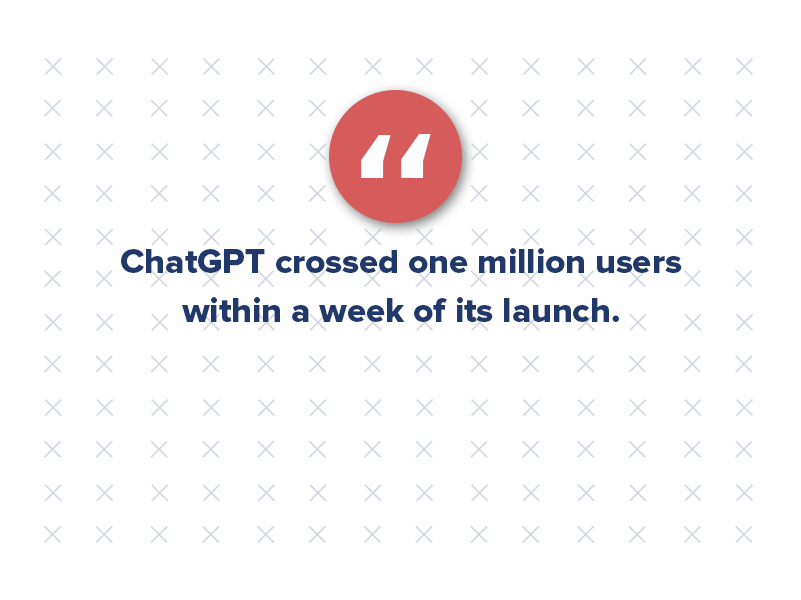
Since ChatGPT launched in November 2022, the world hasn’t stopped talking about it. There are many use cases and ideas, but we haven’t seen enough comprehensive use cases to leverage it in multifamily marketing.
Generative AI Tools and Industry Growth
The generative AI market is booming, with over 2,000 tools now available to help businesses create content, streamline workflows, and innovate across industries. The rapid expansion of this market is fueled by growing interest in AI-driven solutions and substantial investment. In fact, between 2022 and 2023, total investment in generative AI skyrocketed by an astounding 407%. Let’s explore some of the leading tools driving this transformation:
- ChatGPT (OpenAI): A widely used conversational AI tool capable of generating text, answering queries, and assisting with creative projects.
- Google Bard: An advanced conversational AI by Google that excels in generating detailed responses and explanations.
- Gemini (Google DeepMind): Combines generative AI capabilities with Google’s vast knowledge graph for nuanced and reliable responses.
- AlphaCode (DeepMind): A coding-specific AI designed to assist developers in writing and debugging software.
- GitHub Copilot: Powered by OpenAI, this tool enhances coding efficiency by providing contextual suggestions and code snippets.
- Peppertype: Offers content templates for writing articles, meta descriptions, and marketing emails.
- Rytr: Creates SEO-optimized titles, blog posts, emails, and advertisements with a focus on ease of use.
- Jasper: A content generator tailored for marketing teams, featuring multi-language support, collaboration tools, and content templates.
- Copy.ai: Focused on content marketing, this tool generates blog posts, social media updates, and email campaigns.
- MidJourney: A leading AI tool for generating stunning visual designs and artwork.
- Stability AI: Known for developing tools like Stable Diffusion, specializing in high-quality image generation.
A Market on the Rise
The generative AI industry is experiencing unprecedented growth, attracting interest from businesses across sectors. From crafting marketing content to automating repetitive tasks, these tools offer transformative potential. With investment levels surging and innovation accelerating, generative AI is poised to reshape how we approach creativity, productivity, and problem-solving.
Whether you’re a marketer, developer, or business leader, understanding and leveraging generative AI tools can provide a significant edge in today’s competitive landscape. As the market evolves, staying informed and experimenting with these technologies will be key to unlocking their full potential.
ChatGPT by the numbers
- On March 14, 2023, OpenAI launched GPT-4 technology in the ChatGPT Plus Plan, which allows it to generate 25,000+ words in output. As well the model understands 26 languages.
- ChatGPT reached one million users within a week of its launch and 57 million monthly users in the first month.
- ChatGPT crossed the 100 million users milestone in January 2023.
- 13 million individual active users visited ChatGPT per day as of January 2023.
- Microsoft invested $10 billion in OpenAI, gaining 46% of the company’s stake. OpenAI received $ 1 billion from Microsoft in the initial stages of development.
- ChatGPT owner OpenAI predicts that by the end of 2024, they will generate revenue of $1 billion. $200 million in revenue is expected by the end of 2023.
The benefits of AI-powered writing tools
The primary advantage of ChatGPT is its ability to produce large volumes of content quickly and efficiently. This makes it an ideal tool for marketers and content creators who must quickly produce a high content volume. Additionally, ChatGPT can provide marketers with fresh ideas and perspectives on a given topic, helping them to create more engaging and compelling content.
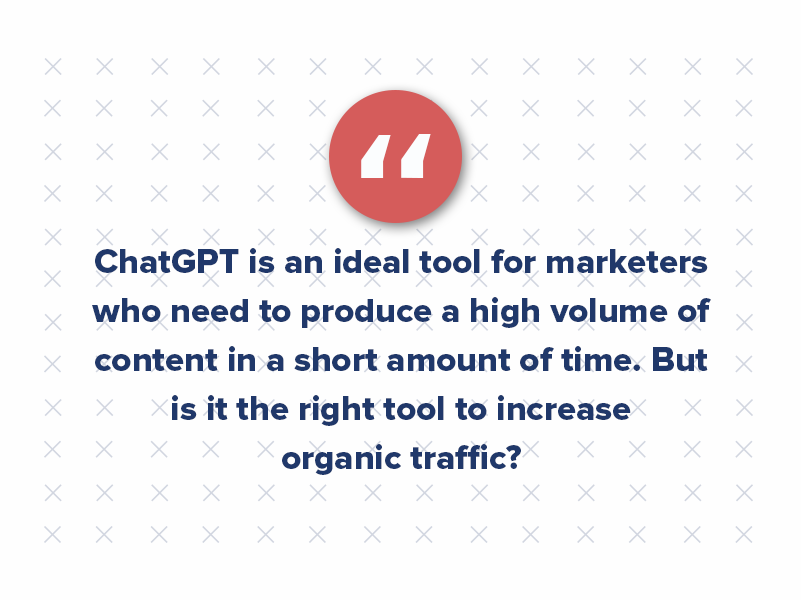
Regarding blog writing and marketing, generative AI is an excellent tool for generating ideas and starting the writing process. By providing a prompt, such as a topic or a keyword, ChatGPT can quickly generate several paragraphs of text that can serve as a jumping-off point for further refinement by a human writer or editor.
Moreover, ChatGPT can help marketers create optimized content for search engines, which is essential for driving website traffic. ChatGPT can suggest keywords and phrases that can improve a blog’s search engine ranking by analyzing search queries and content related to a given topic.
7 limitations of AI in digital multifamily marketing
While generative AI offers several benefits, it is important to understand its limitations. ChatGPT’s writing is generated based on algorithms and statistical patterns, so it may not always capture the nuance or tone that a human writer could convey. ChatGPT also has limited knowledge of cultural and contextual factors that may impact how a specific audience receives content.
Additionally, ChatGPT may struggle to generate content for complex or technical topics requiring high expertise. In these cases, relying on a human writer or editor with the necessary knowledge and experience to create high-quality content may be more effective.
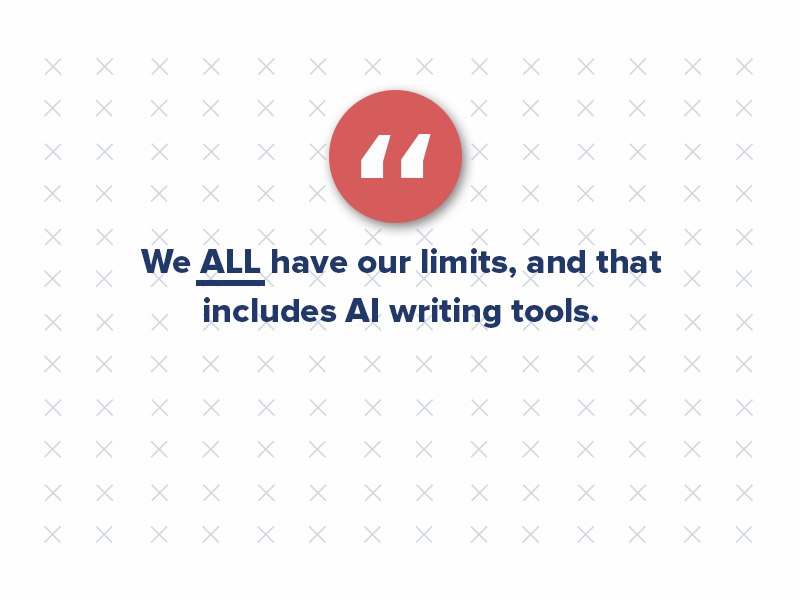
1. AI lacks creativity and personalization.
Despite the many advantages of ChatGPT, human writers and editors are still necessary in today’s marketing world. Human writers bring a level of creativity and personalization to their writing that AI-powered tools cannot match. They can inject personality and voice into their writing that resonates with their audience and helps to build a connection with them.
Furthermore, human writers and editors can provide a level of quality control that AI-powered tools cannot match. They can review content generated by ChatGPT to ensure that it is accurate, engaging, and error-free. They can also ensure that the tone and style of the writing are consistent with the brand’s voice and values.
When you compare content written by AI vs. a human, AI doesn’t have a lot of creativity or personality. Take the following paragraphs as an example. One was generated by AI, and the other by me (the Manager of Content at Criterion.B). I wrote a few paragraphs about web design — specifically, the No. 1 mistake marketers make when building or redesigning their websites.
After writing my version of the topic, I asked ChatGPT to “Write a couple of paragraphs about the No. 1 mistake marketers make when building or redesigning a website.”
Here is my take on the results:
I ran both pieces of content through a plagiarism checker. My content had 0% duplicate content. Meanwhile, 5% of the AI-generated content was considered plagiarism.
Additionally, as you can see, my content was much more informal, specific, and personalized. The AI-generated content (while it is good content) is much more formal, structured, and even a little bit stale in comparison.
While it’s not a bad paragraph and could be used in a blog somewhere, imagine an entire blog written using ChatGPT and how it would sound. The AI-generated content is a bit heavier to read, which could lead to a higher bounce rate over time if all your content is AI-generated.
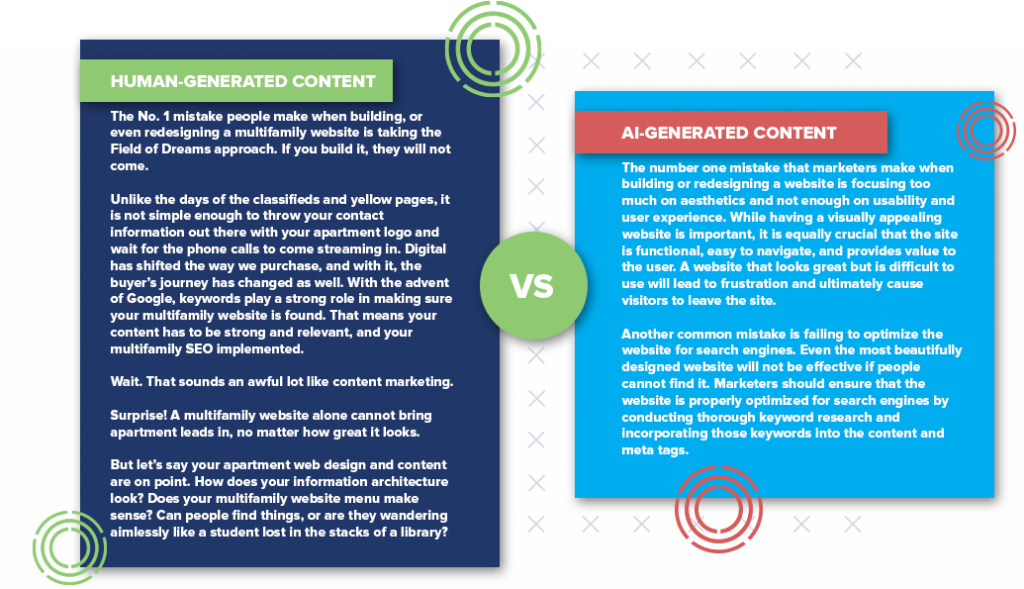
2. AI lacks originality (possible plagiarism alert!)
ChatGPT is not your content creation savior. Sure, it’s powerful and helpful, and maybe the tool will improve significantly in the months and years to come. But for now: relying on ChatGPT for ALL of your content is a disaster waiting to happen.
AI learns from existing content on the web, so it replicates what is already out there. This means it could be a literal copy of something else online. (See the above example where the AI-generated content had 5% plagiarized content.)
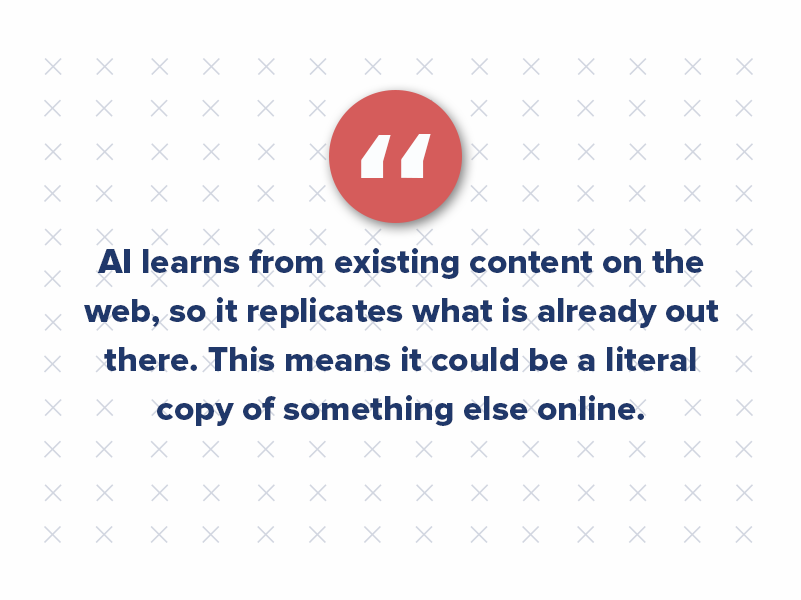
3. AI utilizes an outdated learning model.
Generative AI cannot always provide the correct answers. Did you know that some content from ChatGPT and other writing tools is inaccurate information? This is because AI pulls data from top ranking articles or from what it can find online, so the stats you might see in your content might be inaccurate, outdated, and likely inaccurate. Think about the disclaimer provided in all generative AI results about how it’s “experimental” and users should always fact-check the results.
4. AI lacks emotional intelligence.
AI may be able to simulate human writing, but it lacks emotional intelligence. Human writers and editors can use their emotional intelligence to understand customer needs and write specific content centered around those needs. Emotional intelligence is crucial to successful multifamily marketing, as customers are more likely to engage with a business that understands their needs and values.
5. AI does not know your brand voice.
Every business has a unique brand voice and tone representing its personality and values. Human writers and editors are essential for maintaining and developing a consistent brand voice across all apartment marketing channels. Artificial intelligence tools may be able to write blogs, emails, and website content, but they cannot understand your authentic brand voice. ChatGPT has a lack of context, so AI is not recommended to be used by businesses. The bottom line: Generative AI does not know your business like you do.
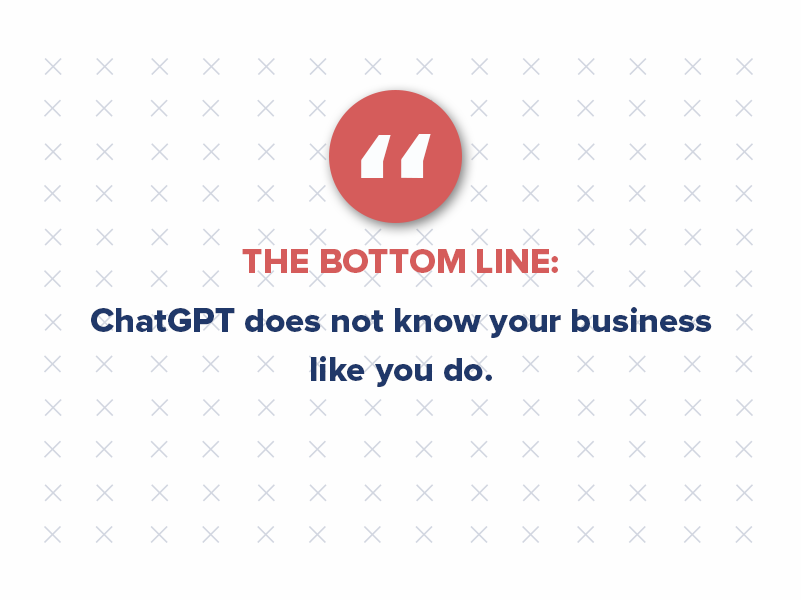
6. AI content has errors.
We are all human (except AI, ha!) and make mistakes. But when you rely on an AI writing tool to generate content for you, you expect it to be nearly flawless. Or, at the very least, free from major errors.
I’ve been testing ChatGPT and other writing tools like Jasper.ai for several months and discovered the content is riddled with errors. Everything from run-on sentences and passive writing to missing punctuation and duplicate content.
Consider the below example. Jasper.ai generated the first paragraph and includes a variety of grammatical errors. While these errors are insignificant, they are still errors that would not be there had human-generated content. Then, compare the “After” paragraph, which is the same AI-generated content that was then edited by me (an actual human editor). Notice the difference in the paragraph’s flow, clarity, and readability.
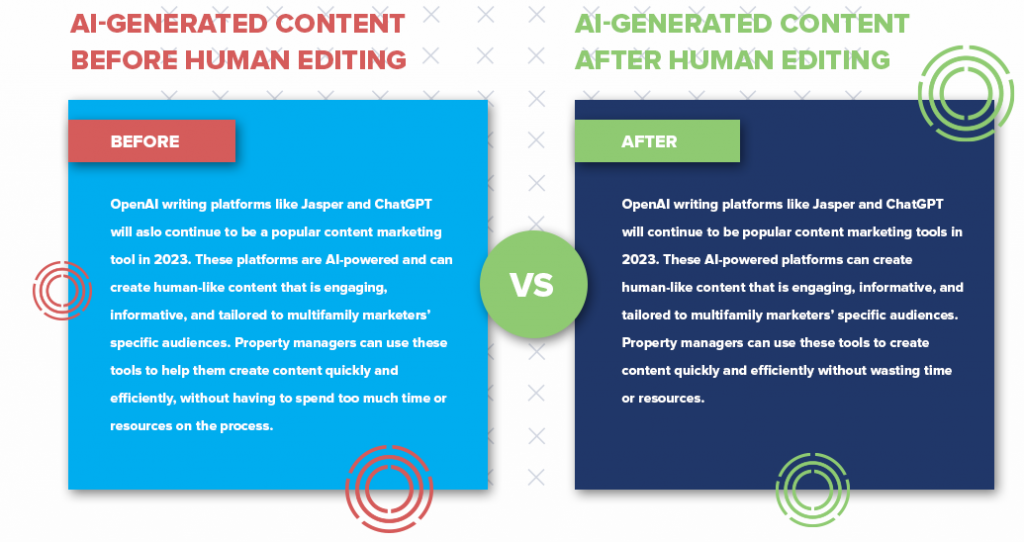
Although Google doesn’t penalize grammar and spelling outright, the bots that scan your content may find it harder to understand what the page or article is about, which could result in lower page rankings and perceived credibility.
7. AI content is not guaranteed to rank well.
Fun fact: Google doesn’t love AI-generated content. Google did release its own AI writing tool, Bard, so the space may change in the coming months and years, but for now, Google can sniff out AI content a mile away.
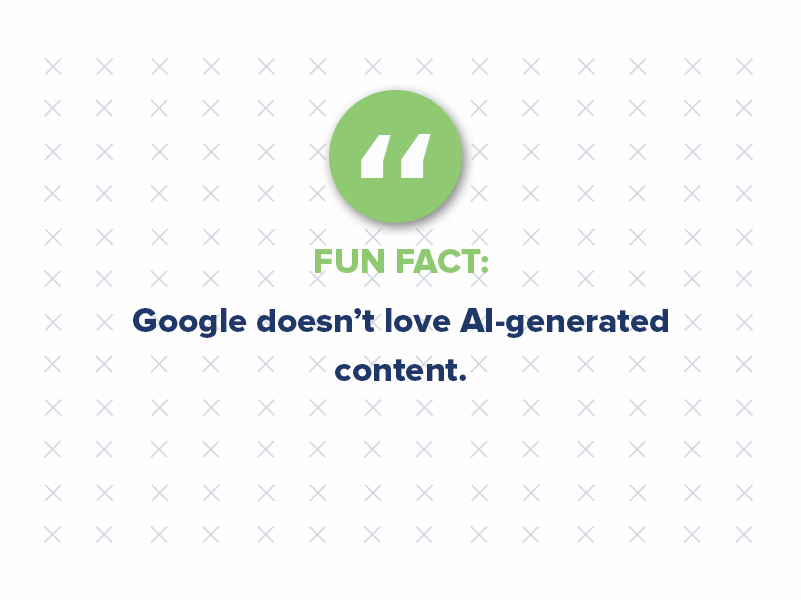
And did you know that Google punishes AI-generated content? That means anything a chatbot spits out will NOT boost your apartment SEO ranking. In fact, it’ll actually hurt it.
How will AI affect search?
Quality still matters over quantity. Just because ChatGPT can help you crank out more content does not mean you will rank well for those pieces. You need an SEO expert to help you rank and strategize effectively.
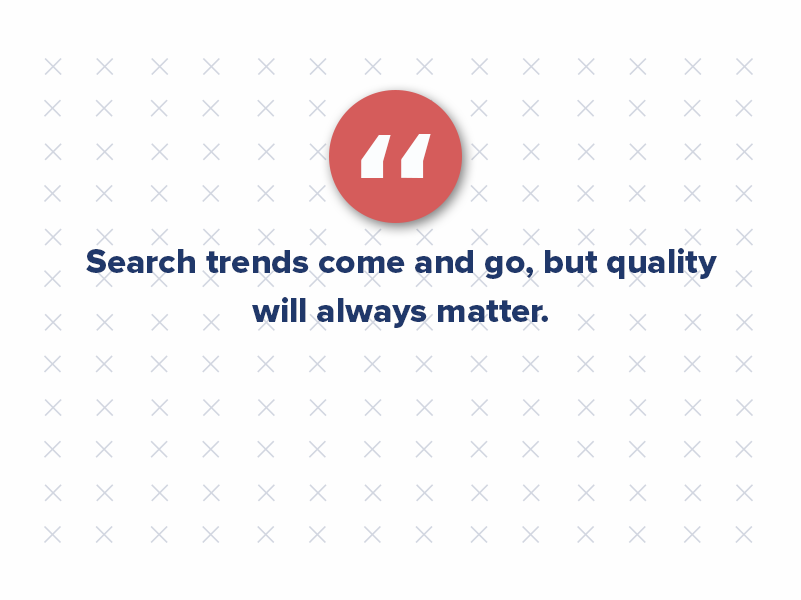
ChatGPT content lacks EEAT (expertise, experience, authoritativeness, and trust). You need this in your content to do well in Google search engine result pages (SERP).
Google provides users with TONS of answers to their queries based on SEO strategies, keywords, backlinks, etc.
A chatbot provides one singular answer. Just one answer. How does the chatbot know the ONE answer to that query? Is bias involved? What if they pulled inaccurate information for the answer? Consider these questions when using ChatGPT, Jasper.ai, Bard, and other tools to help generate answers to your queries and content for your blog.
Will AI replace humans?
No! Remember, ChatGPT requires human editing. Effective apartment marketing requires tapping into the human element, which is something AI can’t do (yet). Natural language processing could change this in the years to come, but for now, ChatGPT is more of a stepping-off point for your content.
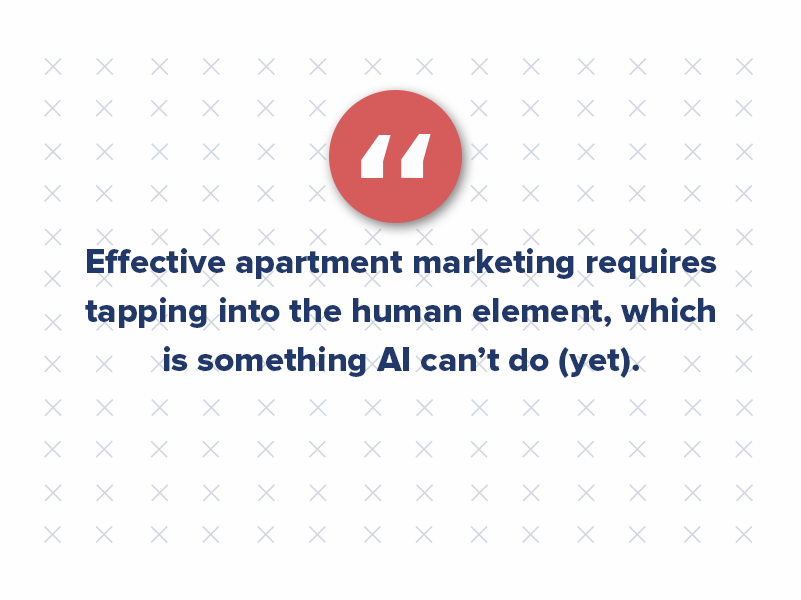
Marketers should harness AI to help batch-create content and save time, then use human editing to refine, hone, and detail the pieces. That’s how you create quality content that resonates. The key is to use AI for what it does best and supplement it with strategic human input.
How to beat your competition at the content marketing game.
So … outdated content, factual errors, plagiarism, and no guarantee of good SEO? That’s not a great recipe for your digital marketing strategy if you ask me.
ChatGPT is an excellent tool to start the writing process, but it should be viewed as a jumping-off point rather than a complete replacement for human writers.

There’s no replacement for human ingenuity. Over the next year or so, AI-generated content will explode. ChatGPT has changed everything, and it’s made everyone (including your competition) think they can pump out a bunch of content without their audience noticing.
But what happens when Google evaluates that content? It will notice the lack of originality. It will read like a robot wrote it — because a robot did! That’s what your competition is going to do. And what’s the best way to compete with your competition? Beat them at the content marketing game!
Want to see the effect the human touch can have on your content? Book a call with Criterion.B now. We’ll get started on your customized strategy and show you how to BEAT your competition with real-life, human-generated content personalized to your business and audience. We’re ready to chat and answer your questions!

